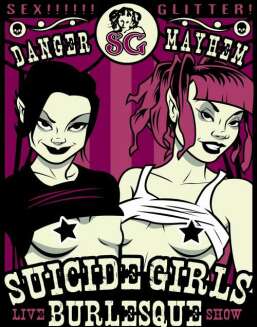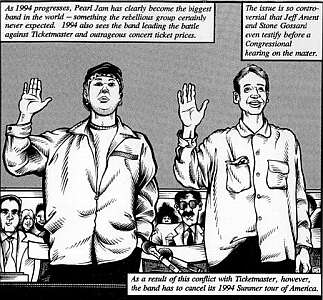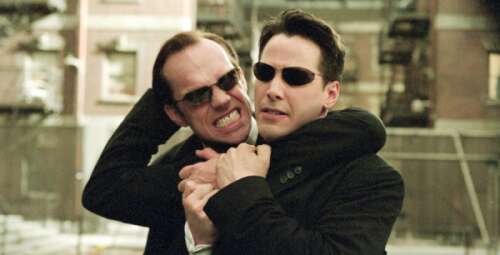Contemplating Suicide: The Suicide Girls Burlesque

Big Fish Pub,
Tempe, AZ
January 13th, 2004
Yes, America may be the land of the free, but that information didn’t appear to have percolated down to the local licensing board, who apparently threatened to close the venue down if the show went ahead. Phoenix has a strange schizophrenia in this area. Nudity is okay, alcohol is okay: the two combined are An Evil Which Must Be Stopped At All Costs. But nothing gets me more stoked than censorship: no-one has the right to tell me what I can and cannot watch. So when we found out the show had been moved to a smoke-free venue in the (allegedly, more liberal) neighbouring city of Tempe, attendance became mandatory.
Yes, America may be the land of the free, but that information didn’t appear to have percolated down to the local licensing board, who apparently threatened to close the venue down if the show went ahead. Phoenix has a strange schizophrenia in this area. Nudity is okay, alcohol is okay: the two combined are An Evil Which Must Be Stopped At All Costs. But nothing gets me more stoked than censorship: no-one has the right to tell me what I can and cannot watch. So when we found out the show had been moved to a smoke-free venue in the (allegedly, more liberal) neighbouring city of Tempe, attendance became mandatory.
A few thoughts on Suicide Girls in general. It’s a website, founded in 2001 out of Portland, which has more strip-clubs per capita than any other US city. The basic concept is the same as any other pay-per-view site: nekkid chicks. But the models here are tattooed, pierced, goth, punk, indie chicks, and the initial concept has exploded to something which claims to be as much about the community of like-minded individuals, as getting the viewer hard/wet. [One wonders how long the site would remain a going concern without the skin, however…]

I have mixed feelings about this. The idea of politically-correct pornography (“sex positive”) is contradictory; eroticism is inextricably linked to a sense of taboo-breaking, which is why we can enjoy smut and animals can’t. [Ironically, burlesque illustrates the central concept nicely.] Half the fun is that it’s not squeaky-clean and socially acceptable. Besides, what’s better than porn for pissing off religious fundamentalists? There’s also a smug sense of superiority to SG, as if its approach is somehow intrinsically “better” than everywhere else on the Internet that sells skin. In truth, while I’m all in favour of diversity, it is just another fetish: some like nurses, some nuns, and others gloomy girls dressed in black, with ripped fishnets.
The women on the site simply fit a different set of stereotypes – you’d find more coloured women at a KKK cookout than on the Suicide Girls press page – and the fact that they write poetry about themselves doesn’t make any significant difference. The illusion of accessibility is hardly anything new in porn, going back at least to the “Readers’ Wives” section in the magazines of my tender youth. [I sense I’ll be quizzed on this revelation by Chris!] Of course, after a decade of surfing, the only web content I’ve ever paid for is my fantasy baseball – unless you have very specific wants, there’s so much free ‘Net nudity, you’d be a fool to pay for it. But no matter how pretentious it may be, it’s mostly harmless fun, despite the claims to be “a contemporary lifestyle brand” on their website.
Unfortunately, “fun” is probably about the last word we can use to describe their burlesque show, which sucked on almost every conceivable level. We could start with the organisational; if you’re going to put on a public striptease show, it makes sense to check, well in advance, that all potential authorities are okay with the concept. Instead, just four days before the performance, the New Times wrote about the show without a hint of trouble – it’s very possible that this article caused the furore, and so we discovered it had been abruptly moved only on the day of the show, while trying to find out the start time. How many less-informed attendees turned up at the original location? As for the new venue, I appreciate it was late notice, but who decided to move to one half the size, with a a stage about two feet high?

Next, let’s discuss the support bands. Yes: support bands. I guess it’s part of the community thing previously mentioned, but it was clear from the audience reaction – “polite disinterest” at best – that they weren’t there to listen to crap guitar-rock like Bloom, who replaced skill with volume. Local band Peachcake opened, and were kinda amusing with song titles like I Hope We Don’t Get Exploded, and had the good sense not to stick around for long.
Then there’s the audience. While I appreciate Suicide Girls have no control over this, those measuring 6’4″ and more should have better grace than to push their way to the front; especially in a venue like this one, they acted like the moon during a solar eclipse. I was immensely pleased to see the bald, bespectacled jerk who’d crammed his way directly in front of me get reamed out by security for taking pics with his digital camera – personally, I’d like to have seen it used to give him an impromptu colonoscopy.
Finally, at around 11:15pm, after seven false starts on the music – more evidence of the level of professionalism here – the girls themselves appeared. But hang on, where was the “punk-rock soundtrack” promised in New Times? Instead, we got Shirley Bassey’s Hey Big Spender, which is about as clichd and predictable as you can imagine. Back in London, I’d seen strippers use Nine Inch Nails and the Revolting Cocks, which was far more imaginative than what we heard here. I mean, Jessica Rabbit’s song from Who Framed Roger Rabbit? Please…
Making things worse, it looked like the evil repressive hand of the licensing board had reared its ugly head, even in Tempe. We’d wondered why there had been so much cutting of duct-tape going on, but when the tops came off, a sense of disappointment rippled back from the lucky few at the front who could actually see. Eventually, we realised why. Just as at the Rockbitch concert, their nipples had been concealed with tape. The show was now reduced to an MPAA rating equal to that for Pirates of the Caribbean.
Most damningly of all, what we saw (admittedly, significantly less than everything, since we were peering through the rows of heads in front – a criticism also levelled at other SG appearances on this tour) was about as erotic as watching your daughter play dress-up. Newsflash to the Suicide Girls: taking your clothes off for a web-site in no way qualifies you to be an exotic dancer. There is an art involved, and it’s entirely separate from looking morosely cute in still pictures.

The crushing banality of the performances, particularly when coupled with the crushing crowd, left us with only one alternative. Now, we don’t run away. Call it touching optimism, but be it music, sports or theatre, we have never departed before the end of any form of live entertainment, no matter how terrible it might be…

At least until that night.
I turned to Chris, and said, “You know, I really wouldn’t mind if we left.” She didn’t need to be asked twice. We squeezed our way through the maddening crowd, popped out the door like a cork leaving a bottle and headed home. Now, I suppose the show might suddenly have improved. The duct-tape might have come off. The choice of songs might have become less banal. The Biblical Rapture might have taken place, and thinned the crowd out a bit. But on the whole, it was a chance we were willing to take.
About the only plus-point I can find to the whole evening – and believe me, I’m trying – is that, at $8, it was a cheap night out. It’s possible that, at another venue, in a city with a more liberal code, and with a better audience, this could have been entertaining. As is, it was a miserable failure that has succeeded in ending any TC interest in burlesque for the foreseeable future.
There is a valuable moral to be learned here, albeit one I probably should have picked up and taken to heart, from my encounters with the forces of darkness (a.k.a. state and national censors), which have been an ongoing battle since the 1980’s. We can now add the Suicide Girls Burlesque to the list of things – Italian cannibal movies, the 2 Live Crew, and Fanny Hill – which all help prove that just because something is banned, does not necessarily mean it is actually any good…
[Subsequent information from the New Times suggests the liquor board were not responsible, and that claim may have been a fabrication by the promoters. Needless to say, if true, this pisses me off even more… Though at least the NT writer also bailed early because of the utter lack of visibility.]







